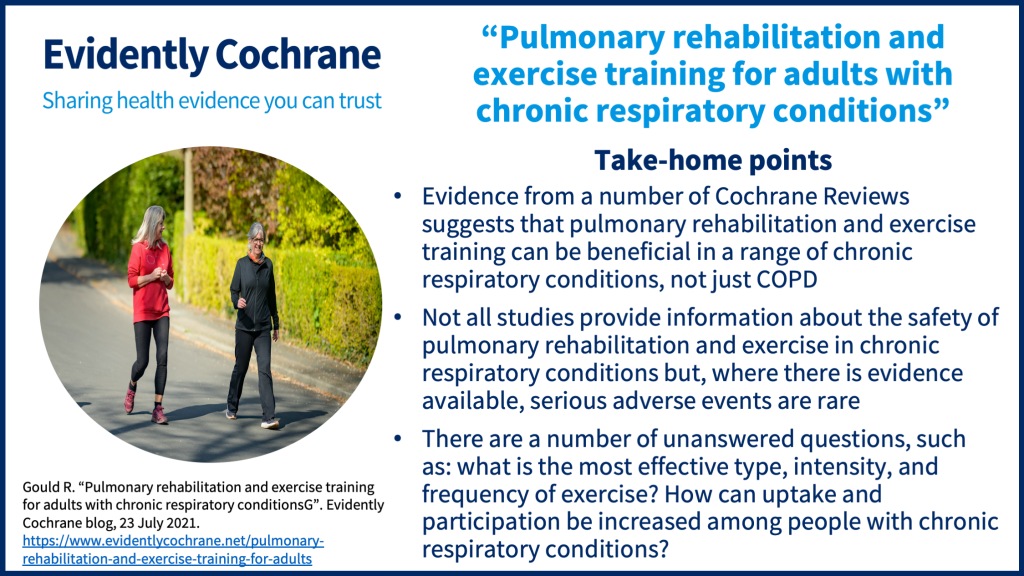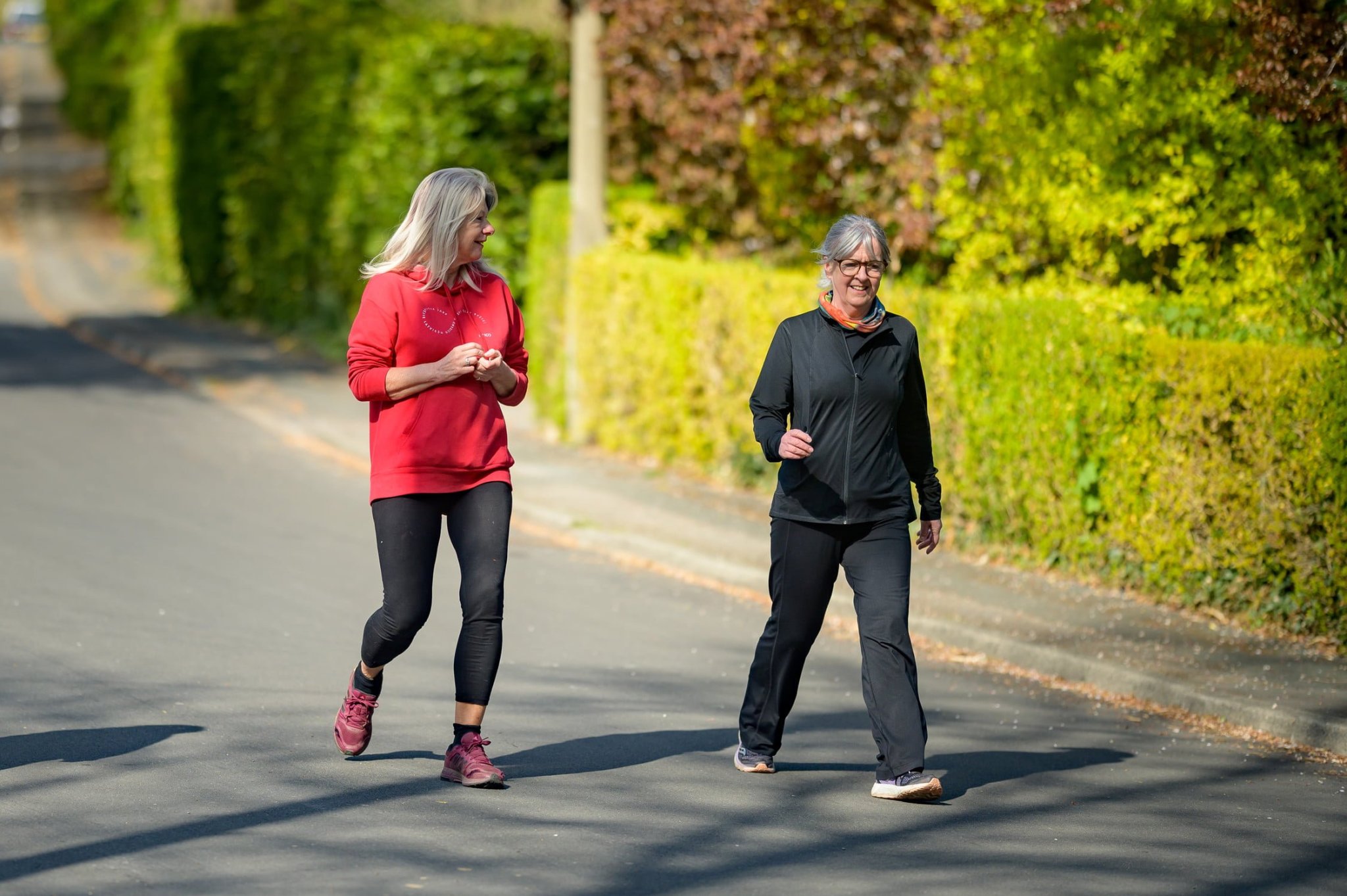In this blog for healthcare professionals, Dr Rebecca Gould, Cochrane UK Fellow and Sport and Exercise Medicine Registrar rounds up the latest Cochrane evidenceCochrane Reviews are systematic reviews. In systematic reviews we search for and summarize studies that answer a specific research question (e.g. is paracetamol effective and safe for treating back pain?). The studies are identified, assessed, and summarized by using a systematic and predefined approach. They inform recommendations for healthcare and research. on pulmonary rehabilitation and exercise training for adults with chronicA health condition marked by long duration, by frequent recurrence over a long time, and often by slowly progressing seriousness. For example, rheumatoid arthritis. respiratory conditions.
Page last updated: 07 November 2022.
Take-home points

For chronic respiratory conditions, including chronic obstructive pulmonary disease (COPD), interstitial lung disease and bronchiectasis, pulmonary rehabilitation or exercise training (a component of pulmonary rehabilitation) may be offered to improve symptoms and exercise tolerance. Currently within the NHS, pulmonary rehabilitation is available to people with COPD or other chronic respiratory problems (including but not limited to interstitial pulmonary fibrosis, interstitial lung disease, bronchiectasis and asthma) who experience impairment in their physical function (typically Medical Research Council [MRC] grade 3 and above), and includes people recently hospitalised with an acuteA health condition (or episodes of a health condition) that comes on quickly and is short-lived. exacerbation.
Several Cochrane ReviewsCochrane Reviews are systematic reviews. In systematic reviews we search for and summarize studies that answer a specific research question (e.g. is paracetamol effective and safe for treating back pain?). The studies are identified, assessed, and summarized by using a systematic and predefined approach. They inform recommendations for healthcare and research. have shown evidence of a benefit of pulmonary rehabilitation and exercise training, but also highlight several areas of uncertainty.
What is the difference between pulmonary rehabilitation and exercise training?
Exercise training for chronic respiratory conditions typically involves aerobic activities (for example walking or cycling) and/or muscle strengthening (resistance) activities. It may also include respiratory muscle training. The frequency of exercise training interventions can vary but is typically between two and five times per week.
Pulmonary rehabilitation is an individually-tailored, multi-disciplinary programme of care for people with chronic respiratory conditions. Within pulmonary rehabilitation, exercise training is included alongside other interventions such as formal education sessions, counselling or behavioural change support.
Both exercise training or pulmonary rehabilitation can be completed in a hospital, community setting (such as a community health centre or leisure centre), or at home.
How do the interventions work?
Despite differences in the underlying cause, adults with chronic respiratory conditions can experience similar symptoms such as breathlessness and fatigue. These symptoms may in turn reduce the amount of physical activity someone does, or create difficulty in day-to-day activities, and lead to further reductions in activity and fitness levels.
For people with chronic obstructive pulmonary disease (COPD), the benefits of pulmonary rehabilitation are well established and a previous blog by Sarah Chapman on Evidently Cochrane looks at this in more detail. Similar benefits have been hypothesised to occur in other chronic respiratory conditions in response to exercise training.
Exercise training for bronchiectasis
This Cochrane Review, published in 2021, looked at the effects of exercise training in people with bronchiectasis. The exercise training interventionA treatment, procedure or programme of health care that has the potential to change the course of events of a healthcare condition. Examples include a drug, surgery, exercise or counselling. must have been at least 4 weeks (or 8 sessions) long and co-interventions such as muscle training, airway clearance techniques and patient education were permitted provided they were also received by the usual care group.
The authors identified six studies (275 participants) that met their inclusion criteria, all studies were in adults and included co-interventions in addition to exercise training.
In people with stable bronchiectasis, exercise training may improve functional exercise capacity (measured by the incremental shuttle walk test and six-minute walk distance) and quality of life, but may make little or no difference to cough-related quality of life nor symptoms of anxiety nor depression.
No studies reported on the occurrence of adverse events.
(People with cystic fibrosis were excluded from this review, but exercise training for cystic fibrosis has been investigated in a separate Cochrane Review published in August 2022. However, overall the studies were small and the authors say that they are “uncertain about the effects” and that “better-quality studies will likely change the findings”).
Pulmonary rehabilitation for interstitial lung disease
Also published in 2021, this Cochrane Review looked at the effects of pulmonary rehabilitation compared to no pulmonary rehabilitation, or another intervention, in people with interstitial lung disease from any cause.
16 studies (675 participants), all in adults, were included in a meta-analysisThe use of statistical techniques in a systematic review to combine the results of included studies. Sometimes misused as a synonym for systematic reviews, where the review includes a meta-analysis. and the authors found that pulmonary rehabilitation probably improves functional exercise capacity, as measured by the six-minute walk test, and may improve maximal exercise capacity compared to no pulmonary rehabilitation or a sham training control group. Pulmonary rehabilitation may also reduce breathlessness, and probably improves quality of life.
Five studies looked at longer-term outcomesOutcomes are measures of health (for example quality of life, pain, blood sugar levels) that can be used to assess the effectiveness and safety of a treatment or other intervention (for example a drug, surgery, or exercise). In research, the outcomes considered most important are ‘primary outcomes’ and those considered less important are ‘secondary outcomes’.. Pulmonary rehabilitation probably leads to a sustained improvement in exercise capacity and may lead to a sustained improvement in breathlessness and health-related quality of life six to 12 months after the pulmonary rehabilitation finished.
DataData is the information collected through research. on adverse events were recorded by 10 studies with no adverse events relating to pulmonary rehabilitation reported.
Pulmonary rehabilitation for asthma
Published in 2022, the Cochrane Review Pulmonary rehabilitation versus usual care for adults with asthma (published August 2022) identified 10 studies (894 participants) that looked at the effect of pulmonary rehabilitation, compared to usual care, in people with asthma. The duration of pulmonary rehabilitation varied between three to four weeks for inpatient pulmonary rehabilitation to eight to 12 weeks in outpatient settings.
The authors found that pulmonary rehabilitation in people with asthma probably improves quality of life (as measured by the St George’s Respiratory Questionnaire) and functional exercise capacity (six-minute walk test) at the end of the intervention, however it is uncertain if these improvements continue in the longer term. The effect on fitness and quality of life, when measured in other ways, were uncertain. It is also uncertain if pulmonary rehabilitation effects rates of asthma attacks, riskA way of expressing the chance of an event taking place, expressed as the number of events divided by the total number of observations or people. It can be stated as ‘the chance of falling were one in four’ (1/4 = 25%). This measure is good no matter the incidence of events i.e. common or infrequent. of hospitalisation, mood or physical activity levels.
Adverse events were not consistently reported, in the one studyAn investigation of a healthcare problem. There are different types of studies used to answer research questions, for example randomised controlled trials or observational studies. that did report adverse events, the proportion was similar between intervention and usual care groups.
Exercise training undertaken by people within 12 months of lung resection for non-small cell cancer
This Cochrane Review, published in 2019, investigated the effect of exercise training in people who had recently (less than 12 months) undergone lung resection (with or without chemotherapy) for non-small cell lung cancer, compared to usual care.
Eight studies (450 participants) were identified. Exercise training was found to increase exercise capacity (as measured by the 6-minute walk test) and probably increases peak rateThe speed or frequency of occurrence of an event, usually expressed with respect to time. For instance, a mortality rate might be the number of deaths per year, per 100,000 people. of oxygen uptake (VO2 peak) in people who had lung resection for non-small cell lung cancer. Exercise training may also increase the physical component of health-related quality of life, probably increases quadriceps muscle strength and may reduce breathlessness but the evidence is uncertain. The effects of exercise training on other components of health-related quality of life, handgrip strength, fatigue and lung function are uncertain.
Adverse events were recorded by four studies, only one study reported an adverse eventA harmful or abnormal outcome, for example death or vomiting, that occurs during or after the use of a drug or other intervention (e.g. surgery or exercise) but has not necessarily been caused by that intervention., and this was a participantA person who takes part in a trial, often but not necessarily a patient. sustaining a hip fracture during balance training.
Exercise training for advanced lung cancer
Published in 2019, this Cochrane Review looked at the effect of exercise training in people with advanced lung cancer (stage IIIb to IV non-small cancer or extensive-stage small cell lung cancer) compared to usual care.
The authors found six studies (221 participants) that met their inclusion criteria. Exercise training may increase functional exercise capacity, as measured by the six-minute walk test, and may improve disease-specific global health-related quality of life compared to usual care in people with advanced lung cancer. There may be little to no difference for breathlessness, fatigue, feelings of anxiety and depression, lung function (FEV1) or physical functioning component of health-related quality of life.
Three studies reported on adverse events, in one study (111 participants) eight minor adverse events (or musculoskeletal injuries) were reported. No serious adverse events were reported.
Future directions in pulmonary rehabilitation and exercise training for people with chronic respiratory conditions
Looking forwards there are still many unanswered questions such as:
- what is the most effective ‘dose’ of exercise (type and intensity of exercise, frequency and duration of sessions, length of intervention etc.) in chronic respiratory conditions?
- what are the most effective interventions for promoting uptake and participation in exercise training and pulmonary rehabilitation, especially in the longer term?
In COPD, the answers to some of these questions have started to be tackled by Cochrane. For example, there have been reviews on the optimal intensity and type of leg exercise training, and water-based exercise training.
Featured image: Centre for Better Ageing
Join in the conversation on Twitter with @CochraneUK and @DrRebeccaGould or leave a comment on the blog.
Please note, we cannot give medical advice and do not publish comments that link to individual pages requesting donations or to commercial sites, or appear to endorse commercial products. We welcome diverse views and encourage discussion but we ask that comments are respectful and reserve the right to not publish any we consider offensive. Cochrane UK does not fact check – or endorse – readers’ comments, including any treatments mentioned.


